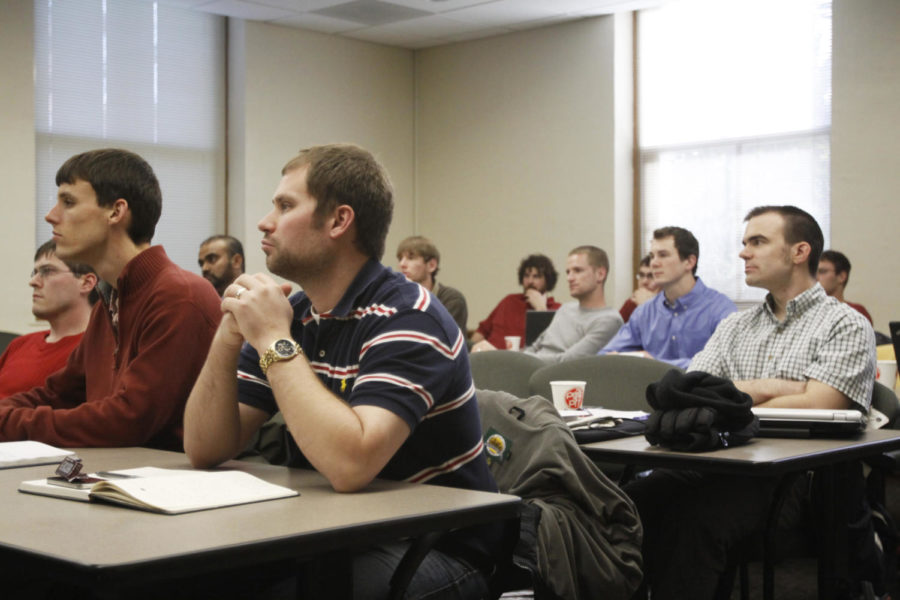Hurricane Sandy does not dampen spirit of research
Photo: William Deaton/Iowa State Daily
A group of staff and students from multidisciplinary research backgrounds in biofuel production listen intentively to a presentation Oct. 31, at Marston Hall. The group was initially supposed to go to Pennsylvania for a biofuel conference but was unable to attend due to Hurricane Sandy, so Robert Brown decided to have an impromptu conference, where the students still gave their presentations and received feedback from other students and staff.
November 1, 2012
While Iowa may have dodged Hurricane Sandy’s left hook as it passed through the East Coast, Iowa State still felt the wake of the storm. One group of staff and students in particular was impacted by the hurricane’s fervor.
Twelve students and four staff from multidisciplinary research backgrounds in biomass gassification and pyrolysis and technoeconomic analysis of biofuels production were originally scheduled to fly out to Pittsburgh on Oct. 29 to present their work at the week-long American Institute of Chemical Engineers conference.
“As of Sunday night, it looked like the storm would pass directly through Pittsburgh,” said Robert Brown, director of ISU-based Bioeconomy Institute and Anson Marston distinguished professor of Engineering. “I made the decision late Sunday not to go based on the fact that I was responsible for a large group, [and] we were essentially flying into a hurricane.”
The risks involved with flying out to the conference were too great, and Brown predicted the airport in Chicago would close at some point. The concern was that the group could get stranded in Chicago for multiple days.
With the flight to Pittsburgh ultimately canceled for Brown and his group, the conference continued without them. Even though the storm did not directly affect the group’s projects, Brown said Hurricane Sandy still blocked an important opportunity for the ISU researchers to present and share their work with peers and scholars worldwide.
“Everyone put in a lot of time and effort into preparing their presentations for the conference,” said Patrick Johnston, Center for Sustainable Environmental Technologies researcher in syngas characterization.
Each of the researchers acknowledged their initial feelings of disappointment at the missed opportunity.
“At first, our reaction was disappointment,” said Kaige Wang, graduate assistant researcher in mechanical engineering. “The flight was canceled, and I think now that we are lucky.”
Even Hurricane Sandy’s clouds have a silver lining: With the trip to Pittsburg canceled, an ideal opportunity arose for the researchers to still present their work on campus in an event Brown dubbed the “Sandy Alternative Symposium.”
“Not a lot of these guys interact with each other on a daily basis. It’s great that we can all get together,” Johnston said. “Everyone could share all their information and knowledge about their subject area of interest because there’s such a large [multidisciplinary] group here.”
The symposium also helped group of researchers to refine their presentations through peer evaluation for future conferences.
“I’m thinking we need to do this every year,” Brown said. “It’s still a good opportunity for them to present and show their peers [at Iowa State] what they are doing.”

















